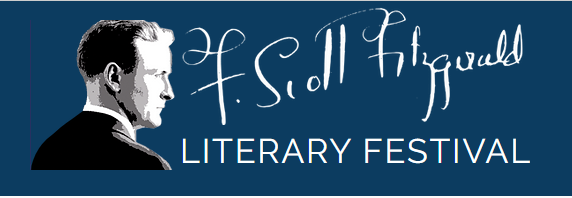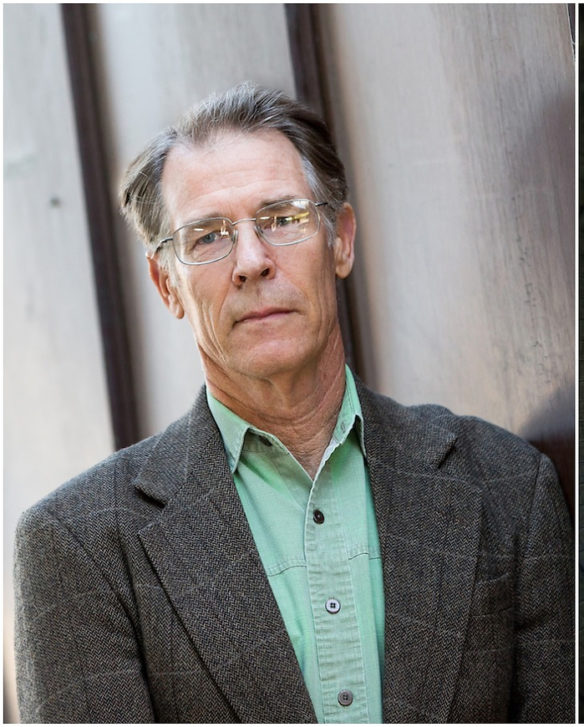
By Mark Roth-Whitworth: I was at the 2022 F. Scott Fitzgerald Literary Festival in Rockville, MD today. If you’re wondering why the festival is there, that’s where Fitzgerald and his wife are buried. Now, I’d never read any of Fitzgerald`s writing, so I spent the evening before reading the first three chapters of The Great Gatsby (copyright having expired last year, it’s online). So far, I’ve yet to find anyone in it that I want to spend any time with, including the narrator.
However, the reason I attended was to see Kim Stanley Robinson, who was the special guest at the Festival. The end of the morning’s big event was a conversation between Stan and Richard Powers. Then there was lunch, and a keynote speaker, then Stan introducing Powers to receive an award from the society that throws the annual Festival.

I wasn’t interested in the writing workshops, as they seemed not useful to my writing, but I got there early enough to take advantage of the coffee, and suggest more signage. In the break room, I had a chance to speak with Stan about his writing. On asking him how he felt about the label Hopepunk, he responded, that everything has to have a “-punk” attached to it is silly and annoying, a feeling I agree with. He commented how, back when cyberpunk was big, that his writing was almost anathema to them. In fact, he preferred a word that he is sure that Joanna Russ coined, a word which no Russ scholars have been able to find, “optopian”, which is “leading to a better world”, if not Utopian, one certainly better than the one we have. (I mentioned my recent manifesto to him, proclaiming the Future Perfectable movement (and my preferred ”grammatical tense’), and he was amused and happy to be considered part of it.)
Eventually, we went to the auditorium for one of the main events, a conversation between Stan and Richard Powers. As they sat down on the stage, I found it amusing that they seemed to be in uniform – both in dark khaki pants and shirts each in a shade of dark brown.
The conversation focused first on Fitzgerald of course, and his writing. Interestingly, Stan noted that Fitzgerald’s writing paid extensive attention to class, mentioning his comment that “the rich are different than us.” Both he and Powers brought up the environment in their writing and the real world, with Stan speaking explicitly to it, Powers elliptically. Stan, being from California, mentioned the ecological devastation of the Central Valley, “turning it into a factory floor for making food” while eliminating the wildlife.
Powers noted that by the end of the Nineteenth Century, literature had absorbed capitalist ideology such that it would have been impossible to write about anything that wasn’t about humans, where SF remembered that the natural world, that the universe, might have other ideas. Back in the Fifties, Stan said, there were a lot of stories that were planetary romance, where humans arrive on a planet and have to cope with that world. Powers commented on how humans saw themselves as above, and different than all the rest of nature, and so there was no romance of surviving in nature, with the idea that we had “won the war” over nature.
Many of the questions from the audience were about writing and culture, rather than about Fitzgerald.
Stan, speaking of how post-war, schools offering MFAs began teaching ‘how to write’, as opposed to before the war, when writers came out of their hometown and got published. In these writing courses, it all had to be about people. They have a number of aphorisms, and he suggests that not all of them are always necessarily true. For example, it is okay to tell, not show, such as showing background.
That struck me as one of the reasons that “Real Litrachur” has always looked down on sf — that it frequently was not only about humans — the universe, its immutable laws, and aliens, get in the way of all about people.
Powers commented that we can, and need to, write of how “to survive the future we’ve brought on ourselves”, and pay attention to the natural world. He went on to speak of time frames, that culture has changed the world so rapidly that a century ago seems like ancient times.
Together, the conversation between the two, and that in response to the audiences’ questions, was well worth my attendance.
Over lunch, Sarah Avery, a fantasy author who remembered me from Capclave, sat at my table, and we had an interesting conversation, one enlightening in part to the young man interested in writing non-fiction who shared our table, about the publishing industry and how one becomes published.
The afternoon keynote speaker was Alice McDermott, whose topic was “Storytelling and the Quintessence of Dust.” She spoke of humans as the quintessence being from Hamlet, and that the theme of the festival was ‘storytelling and more than human’, and referencing January 6th, perhaps it should be “better than human”, that all the assholes are merely human, that nature is not that.
To tell the truth, I found her speech, which seemed to be about half or more nothing but quotes about dust and related subjects from many authors and poets, somewhat assembled and forced. Certainly, I have heard many “lesser” authors, “mere” genre writers, give stronger speeches that grew from their own personal experience. She also noted that much is about humans, who on appearing, are the trouble that enters a story, rather than much sf and fantasy, where we can be that which resolves at least some of the troubles.
Stan made the introductory remarks for Powers, speaking of being a reader, and the joys of friends you have found in reading, even if you never meet them, and about Powers writing, including The Goldbug Variations and Echomancer, which Stan said were about loners, scientists doing science, and making it exciting, which explained to me why they chose Stan as the special guest for the Festival.
Powers for his part, read his favorite among the few short stories he has written, “To The Measures Fall”, and is a good reader, though that seemed more like a novelette than a short story.
Not planning on going to the signing, or the afternoon workshops, I left at this point.
Discover more from File 770
Subscribe to get the latest posts sent to your email.

I stayed for Morgan Gendel‘s screenwriting workshop on generating and pitching a science fiction series. I’d run myself through a crash course in screenwriting, reading all the standard texts with their rigid rules, so I was glad to hear Gendel’s take: There are guardrails beyond which a story won’t work on the screen, and if you know where those are, you don’t need all that rigidity on the inside. Spinning together suggestions from the attendees, none of whom were screenwriters but all of whom were SF readers, we came up with an Afrofuturist setting, a young engineer protagonist in need of redemption and revenge, and a plot with a two-season arc. More importantly, Gendel led us through figuring out which suggestions would work best and why, and how to assemble them. Great fun.